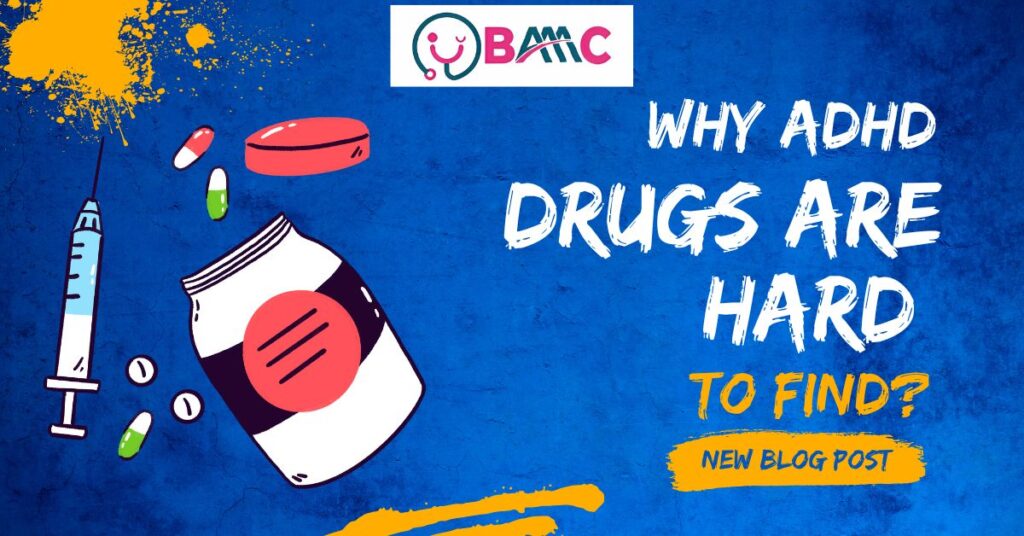ADHD, or Attention Deficit Hyperactivity Disorder, is a neurodevelopmental condition. It is characterized by a lack of focus, difficulty in maintaining attention, impulsiveness, and hyperactivity. There are some medications that are being used to manage this condition. Stimulants, such as Adderall and Ritalin, and non-stimulants, like Strattera, help a lot in managing the symptoms of ADHD. These drugs improve the quality of life by helping individuals improve their behavior and focus. Individuals suffering from ADHD have reported the shortage of ADHD drugs. Individuals suffering from ADHD have reported a shortage of ADHD medications, which has made it very difficult to obtain the medicine for those who rely on them in their daily life.
There are many reasons that contribute to the shortage of the medication, including manufacturing challenges, supply chain disruptions, regulatory issues, and a high demand for ADHD medication. This article explores the reasons behind the shortage of ADHD medication. It also delves into the impact of shortage of medication. Here are the some reasons why ADHD drugs are so hard to find.
1. Manufacturing Challenges
The manufacturing of these medications is very complex, which is one of the major reasons behind its shortage. There are some strict protocols that manufacturers have to follow, which can cause disruptions in the supply of the medication. Furthermore, stimulants like Adderall contain controlled substances such as amphetamine salts. It requires strict observation to ensure that the drugs have been made according to the safety standards. The process can be complex and may cause delays.
Apart from that, in order to produce ADHD drugs, manufacturers need to acquire specific ingredients. These ingredients may run short or there may be quality control issues. Therefore, sometimes a key ingredient runs short or is contaminated. It results in delays in the supply of the whole batch. If companies are manufacturing limited stock of the medicine, it can actually become a huge problem. The delays and disruptions are caused by the lack of arrangements for unforeseen setbacks.
2. Regulatory Restrictions and DEA Quotas
The U.S. Drug Enforcement Administration regulates the production of medication. The DEA sets a quota for the amount of active ingredients that can be produced for manufacturing the medicine. These quotas are set in order to prevent overproduction. Moreover, these quotas prevent the supply of controlled substances to the drug market. These preventions are set for the greater good, but they can be responsible for the shortage of ADHD medication. If the demand for the medication exceeds the supply available, it can result in a shortage of the medication.
Recently, a huge number of people are being diagnosed with ADHD, which has led to a high demand for manufacturers to produce more medicine. On the other hand, the DEA is very slow to respond to high demand for updating the quota system. The requests for higher quotas take a long time to approve. The delay in the supply of medication results in supply gaps. The conservative quotas make it very difficult for manufacturers to meet the high demand for the medication.
3. Rising Demand for ADHD Medications
The significant rise in demand for ADHD medication is a major reason for the shortage of medication. A large number of people are being diagnosed with ADHD due to a greater understanding of the condition. ADHD was considered a children’s disorder, but now several adults also suffer from ADHD. They rely on prescriptions to manage this condition. The significant rise in the number of people being diagnosed with ADHD is putting a strain on the supply of medication.
Moreover, the situation intensified during the COVID-19 pandemic. People were working from home and relying on technology. They found themselves losing focus and concentration. There were more discussions about ADHD symptoms, and as a result, more people got evaluated and prescribed medication. People felt anxious and under stress due to the pandemic. It could be another reason for a large number of diagnoses after the pandemic.

4. Supply Chain Disruptions
There have been unforeseen setbacks in the global pharmaceutical supply chain. The global supply chain was severely disrupted during the COVID-19 pandemic. The pandemic is now over, but the shortage of medication persists. It caused delays in shipment, shortage of raw material and there was a serious shortage of labor force. All of these factors resulted in difficulties in supplying ADHD medication.
The pandemic is now over, but the shortage of medication persists. Due to the pandemic’s impact, manufacturers still experience delays in acquiring raw materials. Production slowdowns continue due to the shortage of labor force. Even if medication is produced, shipping challenges cause delays in the supply of medication.
5. Pharmacy-Level Shortages
People visit pharmacies whenever they need ADHD medication. Pharmacies have experienced a shortage of ADHD drugs. They are unable to fill prescriptions because of a shortage of supply from wholesalers. In extreme cases, pharmacies have to be selective about selling the medication by selling only to patients with urgent needs.
Pharmacies have specific policies regarding the storage of medicine. They do not store large quantities of controlled drugs due to the danger of theft or legal liability. The limited storage further creates a shortage of medication for patients.
Insurance companies also have a role to play in the shortage of medicine. They determine which medicines are covered by insurance and which ones will be paid out by patients themselves. If the medicine is covered by insurance, then patients may experience delays due to insurance issues. This adds another layer to the challenges faced by patients in acquiring ADHD medication.
6. Price Increases and Financial Barriers
If the demand is high and the supply is low, then the prices go up. High prices due to a shortage of medicine make it very difficult for individuals to buy the drug. Pharmacies also contribute to the high prices by charging for medicine that is in short supply, especially if the patient is paying out of pocket. The patients who rely on these medications on a daily basis cannot obtain the medication due to the high prices.
7. The Impact on Patients
Patients who rely on medication to manage their symptoms have experienced the severe impact of shortages. These individuals are unable to stay organized, focus, and complete daily tasks without the medication. The lack of medication affects their career, relationships, and their mental health. For children, it’s difficult to perform at school without medication. Adults cannot perform efficiently in their careers or manage their household responsibilities.
For some patients, the shortage has forced them to switch to alternative medications, which may not be as effective or may come with unwanted side effects. Others have had to reduce their dosage or go without medication altogether, leading to a decline in their quality of life.

The patients are forced to switch medications, which results in using ineffective medicine. In severe cases, the alternative medicine may come with some unwanted side effects. Some patients cannot consume the dosage prescribed by health professionals and have to lower the dosage due to the shortage of medicine.
Final Thought
The shortage of ADHD drugs can be handled only by taking a combined effort. Manufacturers, regulatory agencies, healthcare providers, and policy makers should contribute together and ensure that ADHD medication is available on the market as per the demand for the medicine. This will help individuals suffering from ADHD function properly in their daily lives by managing their symptoms with the help of medicine.

